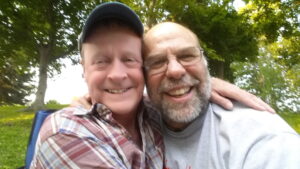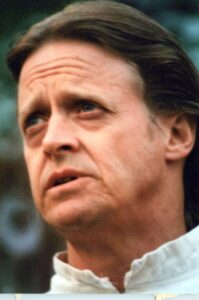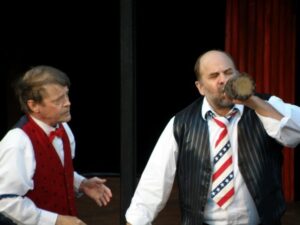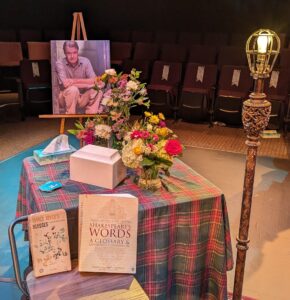
Gerry and me – Romeo and Juliet 2015
Dunkirk NY – Yesterday I attended the memorial for one of the finest actors – and finest people – I’ve ever known. If ever there was a person who fully embodied the Stanislavski quote “There are no small parts; only small actors,” it was Gerry. He was no small actor. He turned every role he ever got into a masterpiece. There was nothing small about Gerry: not his roles, not his talent, not his heart. You might get me to concede he was small in stature, but that only made everything else about him seem that much bigger.

As Henry IV in Henry IV, Part 2
I cannot recall exactly when I first met Gerry, but my first strong recollection of him was in the audition session for the production of Henry IV Part 2 that I directed for Shakespeare in Delaware Park in 1999. He spoke the language eloquently, with a clear affection for it. He was not someone I had initially conceived of for the part of Bolingbroke/Henry IV, but there was something about his bearing on stage that echoed Henry IV as an older man, years apart from the person who deposed Richard II. “Uneasy lies the head that wears the crown” is the last line of Henry IV’s opening monologue, and it seemed to be living in Gerry. So I cast him in the role, and he, of course, delivered, as he always did. His embodiment of an older king, regretful of his past, worn down by his obligations, and concerned for his seemingly miscreant son, was exactly what I wanted, without clearly knowing it at the time.
From that point on we developed a great friendship, one steeped in a friendly rivalry. Both of us are character actors, and often we were up for the same roles, but he always had so much more “character.” Gerry had a far more interesting character face that I’ve ever had. It looked like a face that had been dragged through 100 miles of bad road. He had a craggy look, with character lines on top of character lines. And he could turn that face into a thousand different emotions, from the sorrows of an old man whose life had been hard, to the impish joy of a sly devil who just pulled a fast one on you. I always thought he was the re-incarnation of the famous Irish actor Barry Fitzgerald. His mastery of Irish dramatic literature was well-known in Buffalo, and as I learned yesterday, he appeared in 45 productions at the Irish Classical Theatre Company in Buffalo, several of them as the classic Irish character down on his luck whose ambition was always just a little out of his reach.

Trinculo/Sebastian – The Tempest 2008
He was a fan favorite at Shakespeare in Delaware Park as well. Perhaps our biggest “rivalry” was who could play the Gravedigger best. We’d have a good time throwing barbs at each other after seeing one another’s performance of the role. We failed, however, to achieve our shared dream of playing the two gravediggers together, alternating Gravedigger 1 and 2 each night. But we did have great fun playing Sebastian/Trinculo in The Tempest, and Pistol/Fluellen in Henry V. I think he enjoyed just a little too much giving me that leek to bite into every night in that show.
What went unspoken at his memorial, however, and which was a love shared by us both that went beyond the theatre, was our mutual love of baseball. Gerry was born in Philadelphia, and was a die-hard fan of the Phillies, dating back to the Whiz Kids era. I grew up with Mantle and Maris and the NY Yankees, so we both had baseball memories that stretched far into the past. He didn’t much like the Yankees, but he didn’t hold that against me. After a time we got into the habit of wishing each other a Happy Opening Day as each new baseball season began. During the 2009 World Series, which featured the NY Yankees against the Philadelphia Phillies, we spent the entire series texting with each other as the games were played. Last year, when the Phillies played against the cheating Houston Astros, I lent him my full support, became a temporary Philly Phanatic, and texted with him as the games were played and I ducked in and out of rehearsal to check the score. My final communication with him was just this past April, as the Yankees opened the season with their second series against the Phillies. The Yankees took that early series, two games to one. We texted a bit, and of course I had to get his opinion about the pitch clock, which he did not like at all. Here’s his response:
You can watch on YouTube game 7 of the 1952 WS (Yanks Dodgers) and to a man no hitter stepped out of the batter’s box between pitches. It was and should be the way the game is played. Fuck rules that screw with the game’s natural rhythm. Television took care of that. I think I mean that “they” keep trying to make it a TV sport when it just ain’t.
He had a deep respect for the timelessness of the game, its rhythms and flow – a reverence that matched my own. It was the last message I received from him – classic Gerry.
It’s rare to find someone in life who shares the same depth of passion for the things you revere as well. Gerry’s passion for the theatre and its rituals, and baseball and its beauty, were what we shared together. I shall miss Gerry tremendously. The knowledge that I’ll never see him on the stage again, or work with him in a show again, or text “Happy Opening Day” to him again, weighs heavy on my spirit. The greatest hardship of getting older is not the aches and pains of the body, but rather the heartaches of the soul as, one by one, you begin to lose those deep friendships that matter, knowing that they can never be replaced. My solace will lie in the fact that, when I come to work at the Irish Classical Theatre Company again in 2024, I will be able to see the ghost light that was gifted to the theatre in Gerry’s memory. It’s a fitting tribute to a man whose light shone on so many others and gave to them the gift of theatrical joy. To paraphrase Stanislavski, “There are no small lives; just small people.” Gerry’s life was a shining example of how all of us should live, taking whatever smallness we have measured against the vastness of this dark universe, and giving it a great bright light. -twl

